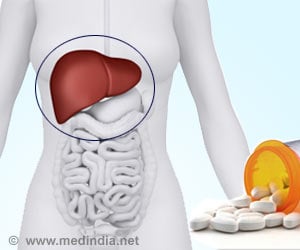A fixed-dose combination of sofosbuvir plus velpatasvir is highly effective in treatment of patients with hepatitis C virus (HCV) genotypes.

Among the newer treatments recommended for hepatitis C is a combination of antiviral drugs sofosbuvir and ribavirin. Ribavirin causes blood-related side effects, and can cause fetal malformations when given to pregnant women. It has to be given in multiple doses, which may affect patient compliance.
A new drug being considered as a substitute for ribavirin is velpatasvir, though it is not yet approved by the FDA. Studies published in The New England Journal of Medicine indicate that sofosbuvir – velpatasvir combination may be a good option for the treatment of hepatitis C infection. Some patients included in these studies had received prior treatment for hepatitis C. In the ASTRAL-1, ASTRAL-2 and ASTRAL-3 studies, some patients had compensated cirrhosis of the liver. Compensated cirrhosis is a condition where permanent changes in the liver have occurred, but they have not yet caused symptoms in the patient.
In the treatment of hepatitis C, a sustained virological response is considered as an indicator of successful treatment. In these studies, a sustained virological response was considered as undetectable hepatitis C RNA protein in the blood at the end of 12 weeks following completion of treatment.
The ASTRAL-1 study was conducted in hepatitis C patients with genotypes 1, 2, 4, 5, or 6. Patients were treated either with a sofosbuvir – velpatasvir combination or placebo for a period is 12 weeks. Treatment with sofosbuvir – velpatasvir showed a 99% sustained virological response as compared to 0% patients who were administered a placebo.
In the ASRTAL-4 study, the same combination of sofosbuvir and velpatasvir was studied in patients with genotypes 1 through 6, but the patients had decompensated liver cirrhosis. Decompensated liver cirrhosis is a serious condition, where the patient suffers from symptoms due to the cirrhosis. These patients often need liver transplantation.
In the above studies, common adverse effects noted were headache, fatigue, sore throat, insomnia, and nausea. Some patients did suffer from severe effects, but they may or may not be directly attributable to the medication.
The sofosbuvir– velpatasvir combination thus appears to have several benefits over the current treatments:
- The combination can be administered as a single tablet once daily, thereby improving patient compliance
- The treatment duration is sometimes shorter than currently used regimens
- It can be given to some patients who cannot use other drugs like ribavirin; side effects of ribavirin can also be avoided
- Since the same dose and duration is effective against all genotypes, testing for genotypes before treatment may not be necessary
- The combination appears to be effective irrespective of whether patients were previously treated or untreated for hepatitis C.
References:
1. http://www.cdc.gov/hepatitis/hcv/hcvfaq.htm2. JJ Feld et al. Sofosbuvir and Velpatasvir for HCV Genotype 1, 2, 4, 5, and 6 Infection. The New England Journal of Medicine. Published Online: November 17, 2015 DOI: 10.1056/NEJMoa1512610
3. GR Foster et al. Sofosbuvir and Velpatasvir for HCV Genotype 2 and 3 Infection. The New England Journal of Medicine. Published Online: November 17, 2015 DOI: 10.1056/NEJMoa1512612
4. MP Curry et al. Sofosbuvir and Velpatasvir for HCV in Patients with Decompensated Cirrhosis. The New England Journal of Medicine. Published Online: November 17, 2015 DOI: DOI: 10.1056/NEJMoa1512614
Source-Medindia















